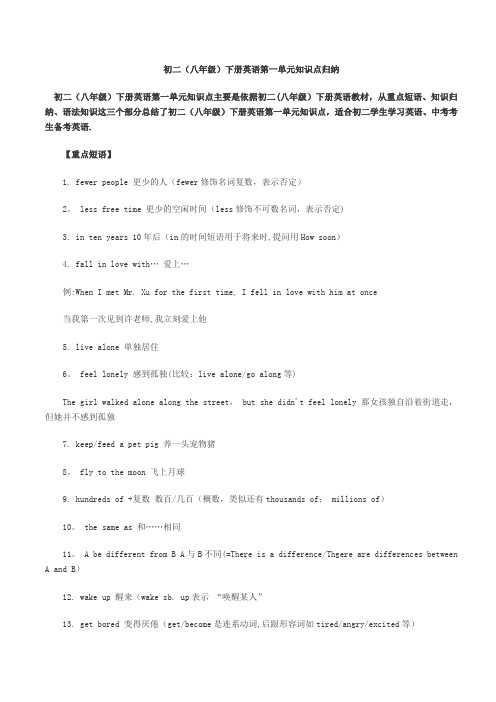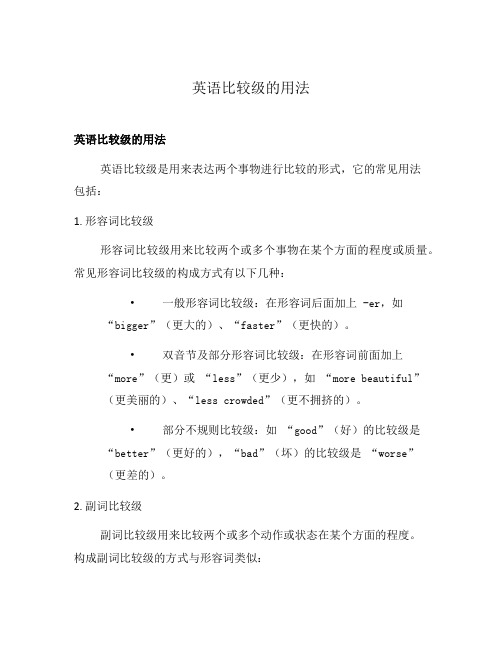fewer,less,more的不不同用法
限定词(some,any,many,much, more,most, lots, few, little

the more…, the more…越…,就越...
The more I thought about it, the less I liked the idea
more and more + adj./ adv.越来越…
Changan Avenue is getting more and more beautiful.
a little (+ n.)一点儿,少量(= not much),修饰不可数名词
Ilikealittle butter on my bread.(=Idon’t like much butter on my bread.)
a few of + n.一些、几个
Let me briefly highlight a few of the achievements of the past year.
Many people took part in 10,000-metre race, but only a number of them kept on running to the end.
many/much
many/muchadj. (more/most)
可以在前面接very, so, too等词修饰。
The situation has improved very little.
a few/a little
a few (+ n.)一些、几个(= not many),修饰复数名词,比few表示的数量要多。
Only a few stayed for dinner.
Jane knows a few people in Shanghai.(= Jane doesn’t know many people in Shanghai)
人教版英语八年级上册 Unit 7-专题讲解:掌握moreless,morefewer的用法

单位名称
填写时间
2020.8.20
学科
初中英语
年级/册
八年级上册
教材版本
人教版
课题名称
Unit7.Will people have robots?
难点名称
掌握more/fewer;more/less的用法
难点分析
从知识角度分析为什么难
more和less本身对于学生来说是比较级的难点,而本课新增加了他们修饰名词的用法,more又比较特殊,所以讲清楚more和less的用法对老师的基本功是一个考验。所以我编了口诀来方便学生们记忆。
作形容词,根据more的原级引出many/much,用以解释他既可以修饰可数名词又可以修饰不可数名词
2.less的两种用法:
作副词,修饰部分双音节词和大部分多音节词adj/adv的比较级的修饰部分,举例呈现;
作形容词,根据less的原级引出little,用以解释它可以修饰不可数名词。
3.fewer 的一种用法
作形容词,根据fewer的原级引出few,用以解释它可以修饰可数名词。
最后总结出口诀
不可少less,
可少fewer,
可不可多more
课堂练习
(难点巩固)
分两个部分练习
1,选词填空。结合口诀和语境选择。
2,选择题,结合口诀和语境选择。
小结
知识如果知识一味的照搬,就会失去活力,在教学中要学会做有心人,善于学习,思考,所以口诀学习感叹句对于初中生来说很有意义和好处,最后请同学们将齐读口诀五遍。
教学环节
教学过程
导入
通过“Less is more”的翻译,让同学们分享对这句话的理解,引出more/Less/fewer的用法讲解。
初二英语下册知识点归纳

初二(八年级)下册英语第一单元知识点归纳初二(八年级)下册英语第一单元知识点主要是依据初二(八年级)下册英语教材,从重点短语、知识归纳、语法知识这三个部分总结了初二(八年级)下册英语第一单元知识点,适合初二学生学习英语、中考考生备考英语.【重点短语】1. fewer people 更少的人(fewer修饰名词复数,表示否定)2。
less free time 更少的空闲时间(less修饰不可数名词,表示否定)3. in ten years 10年后(in的时间短语用于将来时,提问用How soon)4. fall in love with…爱上…例:When I met Mr. Xu for the first time, I fell in love with him at once当我第一次见到许老师,我立刻爱上他5. live alone 单独居住6。
feel lonely 感到孤独(比较:live alone/go along等)The girl walked alone along the street, but she didn't feel lonely那女孩独自沿着街道走,但她并不感到孤独7. keep/feed a pet pig 养一头宠物猪8。
fly to the moon 飞上月球9. hundreds of +复数数百/几百(概数,类似还有thousands of; millions of)10。
the same as 和……相同11。
A be different from B A与B不同(=There is a difference/Thgere are differences between A and B)12. wake up 醒来(wake sb. up表示“唤醒某人”13. get bored 变得厌倦(get/become是连系动词,后跟形容词如tired/angry/excited等)14. go skating 去滑冰(类似还有go hiking/fishing /skating/bike riding等)15. lots of/a lot of 许多(修饰可数名词、不可数名词都可以)16。
英语比较级的用法

英语比较级的用法英语比较级的用法英语比较级是用来表达两个事物进行比较的形式,它的常见用法包括:1. 形容词比较级形容词比较级用来比较两个或多个事物在某个方面的程度或质量。
常见形容词比较级的构成方式有以下几种:•一般形容词比较级:在形容词后面加上 -er,如“bigger”(更大的)、“faster”(更快的)。
•双音节及部分形容词比较级:在形容词前面加上“more”(更)或“less”(更少),如“more beautiful”(更美丽的)、“less crowded”(更不拥挤的)。
•部分不规则比较级:如“good”(好)的比较级是“better”(更好的),“bad”(坏)的比较级是“worse”(更差的)。
2. 副词比较级副词比较级用来比较两个或多个动作或状态在某个方面的程度。
构成副词比较级的方式与形容词类似:•一般副词比较级:在副词后面加上 -er,如“faster”(更快地)、“higher”(更高地)。
•双音节及部分副词比较级:在副词前面加上“more”(更)或“less”(更少),如“more easily”(更容易地)、“less often”(更少地)。
•部分不规则副词比较级:如“well”(好地)的比较级是“better”(更好地),“badly”(糟糕地)的比较级是“worse”(更糟糕地)。
3. 名词比较级名词比较级主要用于表达两个或多个事物在数量或程度上的差异。
常见的名词比较级用法有以下几种:•比较数量:使用“more”(更多的)或“fewer”(更少的)来表达两个事物数量上的差异,如“more students”(更多的学生)、“fewer cars”(更少的汽车)。
•比较程度:使用“higher”(更高的)或“lower”(更低的)来表达两个事物在程度上的差异,如“highertemperature”(更高的温度)、“lower price”(更低的价格)。
4. 动词比较级动词比较级主要用于比较两个或多个动作或状态在程度上的差异。
morelessfewer简单易懂的用法区别

Tina and Sam are taking about the life at present and the life in
100 years.
Isn't it amusing? Are you interested in it? let's follow them and know more about our life.
典例展示 1.About Population
• Tina: Today, there are so many people all over the world.
• Sam: I think there will be more people in 100 years.
•
many 许多、大量
more 更多,是many的比较级
• A. less; less • C. fewer; less
B. less; more D. fewer; more
•
much 许多,大量
more 更多,是much的比较级
两者都修饰不可数名词pollution
典例展示 3.About Trees, Flowers and birds
• Tina: There are few trees, flowers and birds in my hometown because of the pollution.
•
less修饰不可数名词homework
more 修饰不可数名词time
挑战自我
put the words in the correct columns in the chart
job, people, pollution, robot, fresh water, paper, planet, cars, clean air, city, free time, building, money, tree
less、fewer、lesser的用法比较

s
!
It
’5
t
h
e
P
r 亡,
l
de
n
t
l、 i m
s e
{f
.
,,0
l e 、5
.
天啊
T
居 然 是 急统 本 人
w
e r e
,
h
e r e
,口
l护
55
th
u ),
a
r
ho
J
u s a n
d pe
o
p le
t
he
r e
bu
y [n
g
t
ie k
e
t、
在那里 买 票的不 下
t
e r
m
a n
.
。
从 未 有过 一 位 更 友 好 更 公 正 的 人 而 不能 说
`
:
T
h
e r e
n
e v e r
w
a s
a
m
o r e
k in d
a n
d Ju
s
t
m
a n
.
但 为 r 加 强 句 子 的 语 气 将 作 定 语 用 的形 容 词 比 较 级 形 式 置 于 被 r 修 饰 名 词 之 后 时 我 们 则 又 可使 用 m o 式 比如 我 们 可 以 把 例
《 ( 月刊 ) 英 语知 识 》
1 99 9
年第
期 ( 总第
11
期)
、
、
的
广 东
。
用
法
比
较
庄
艳
在 英 语 中是 一个 常 用词
限定词some,any,many,much,more,most,lots,few,
第二/三…
Canada, the second largest country in the world, lies in the north of America
little/few
little (less/least), few (fewer/fewest)
the most + n.(可数/不可数): 最多/最高的…
the most children最多的孩子
the most trouble最多的麻烦
most+ n.(可数/不可数):大多数的…
most people/most research
most of the +n.(可数/不可数) 大多数的
These?activities?occupied?most?of?her?time.这些活动占用了她大部分时间。
相关搭配:
the more…, the more…越…,就越...
The more I thought about it, the less I liked the idea
more and more + adj./ adv.越来越…
Changan?Avenue?is getting?more?and?more?beautiful.
相关搭配:
at most最多(反义词组at least至少)
It’ll take 20 minutes at the most.?
most 最、非常
Ilike English most/best.我最喜欢英语。
Thank you for a most interesting evening.
初二英语第一单元知识点梳理
初二英语第一单元知识点梳理初二英语第一单元知识点梳理1. fewer people 更少的人(fewer修饰名词复数,表示否定)2. less free time 更少的空闲时间(less修饰不可数名词,表示否定)3. in ten years 10年后(in的时间短语用于将来时,提问用How soon)4. fall in love with… 上…例:When I met Mr. Xu for the first time, I fell in love with him at once当我第一次见到许老师,我立刻爱上他5. live alone 单独居住6. feel lonely 感到孤独(比较:live alone/go along等)The girl walked alone along the street, but she didn’t feel lonely那女孩独自沿着街道走,但她并不感到孤独7. keep/feed a pet pig 养一头宠物猪8. fly to the moon 飞上月球9. hundreds of +复数数百/几百(概数,类似还有thousands of; millions of)10. the same as 和……相同11. A be different from B A与B不同(=There is a difference/Thgere are differences between A and B)12. wake up 醒来(wake sb. up表示“唤醒某人”13. get bored 变得厌倦(get/become是连系动词,后跟形容词如tired/angry/excited等)14. go skating 去滑冰(类似还有go hiking/fishing /skating/bike riding等)15. lots of/a lot of 许多(修饰可数名词、不可数名词都可以)16. at the weekends 在周末17. study at home on computers 在家通过电脑18. agree with sb. 同意某人(的意见)19. I don’t agree. = I disagree. 我不同意20. on a piece of paper 在一张纸上(注意paper/information/news/work/homework/housework等常考到的不可数名词)21. on vacation 度假22. help sb with sth/help sb do sth 帮助某人做某事23. many different kinds of goldfish 许多不同种金鱼24. live in an apartment 住在公寓里/live on the twelfth floor 住在12楼25. live at NO.332,Shanghai Street 住在上海路332号26. as a reporter 作为一名记者27. look smart 显得精神/看起来聪明28. Are you kidding? 你在骗我吗29. in the future 在将来/在未来30. no more=not …anymore 不再(强调多次发生的动作不再发生)I’ll go there no more.31. no longer=not… any longer 不再(强调状态不再发生)32. besides(除…之外还,包括)与except …but(除…之外,不包括)33. be able to与can 能、会l (be able to用于各种时态,而can只能用于一般现在时态和一般过去时态中;have to用于各种时态,而must只能用于一般现在时态)例如:1.I have been able to/will be able to speak two languages. (不可以用can)2. had to stay at home/ will have to (不可以用must)34.be big and crowded 大而且拥挤34. be in college 在上大学35. live on a space station 住在空间站36. dress casually 穿得很随意casual clothing 休闲服饰37. win the next World Cup 赢得世界杯 win award 获僵38. come true 变成现实39. take hundreds of years 花几百年的时间40. be fun to watch 看起来有趣41. over and over again 一次又一次42. be in different shapes 形状不同43. twenty years from now 今后20年【本单元目标句型】1. What do you think life will be like in 1000 years?2. There will be fewer trees、more buildings and less pollution in the future.l fewer; less表示否定之意,分别修饰可数名词和不可数名词;more二者都可以修饰。
辨析lessfewer与more-学易试题君之每日一题君2019学年上学期八年级英语人教版
more
"更多的",many和much的比较级
修饰可数名词复数、不可数名词
There will be more people and more pollution.
将会有更多的人和更多的污染。
【注意】
1. less也可作副词,意为"较少地,更少地",常用来修饰形容词、副词或动词。其反义词为more,用法与less相同。
【答案】D
【归纳拓展】
辨析less, fewer与more
le ss
"较少的,更少的",little的比较级
修饰不可数名词
People will have less free time.
人们将会有更少的空闲时间。
fewer
"较少的,更少的",few的比较级
修饰可数名词复数
There will be fewer mistakes in your homework if you are more careful.
2018年12月31日
辨析less, fewer与more
中考频度:★★★★☆难易程度:★★★★☆
(2018﹒苏州)He was advised to eat fewer hamburgers and drinkcola to keep fit.
A. muchB. moreC. fewerD. less
A. fewerB. largerC. moreD. less
2.I spend _______ time on my homework than you do. Maybe you have _______ homework than I do.
A. less; muchB. more;less
more less fewer的区别
more less fewer的区别
一、意思不同
1.more意思:(数、量等)更多的,更大的
2.less意思:(与不可数名词连用)较少的,更少的
3.fewer意思:较少的
二、用法不同
1.more用法:more用作副词是many和much的比较级,可构成多数
两个或两个以上音节的形容词或副词的比较级,但通常不可构成表示方位、绝对或极限意义、时间概念、事物的性质或结构成分、顺序或含明确数学
概念、几何形状或以or结尾等的形容词或副词的比较级。
2.less用法:less是little的比较级,基本意思是“较少的,更少的”,指物体的体积或分量相对于别的物体少。
less用作副词时的意思
是“较少,更少,少”,可用来修饰动词、形容词或副词。
3.fewer用法:意思是“很少的…,几乎没有的…”,表示“虽然有,但很少”,强调“少”,表示否定的意思。
三、后接词不同
1.more后接词:后面可以接可数名词也可以接
不可数名词。
2.less后接词:接不可数名词。
3.fewer后接词:接可数名词。
- 1、下载文档前请自行甄别文档内容的完整性,平台不提供额外的编辑、内容补充、找答案等附加服务。
- 2、"仅部分预览"的文档,不可在线预览部分如存在完整性等问题,可反馈申请退款(可完整预览的文档不适用该条件!)。
- 3、如文档侵犯您的权益,请联系客服反馈,我们会尽快为您处理(人工客服工作时间:9:00-18:30)。
区别一a little和little修饰或代替不可数名词,与much相对,表示“多”;a few和few 修饰或代替可数名词与many相对,表示“少”。
a little和a few含肯定语气,little和few含否定语气。
一般说来,在only, just, still, quite, can, not等词后用a little或a few;在very, so, some, the, no等词后用little或few
more 更多less 更少few 几乎没有,修饰可数名词复数There are few people here.这儿几乎没人。
little几乎没有,修饰不可数名词There are little water in the cup.杯子里几乎没水。
其实你还要注意a few 还有 a little 跟他们的区别 a few 一些,修饰可数名词复数There are a few people here.这儿有一些人。
a little一些,修饰不可数名词There are a little water in the cup.杯子里有一些水
a few, few后面加可数名词 a little, little后面加不可数名词
另外:few和little均表否定,而a few和a little均表肯定,例如:
1. There are a few books on the table, aren't there?
2. There are few books on the table, are there?
3. There is a little milk, isn't there?
4. There is little milk, is there?
Few-fewer-fewest many-more-most (修饰可数名词)
little- less- least much-more- most (修饰不可数名词)
There be 句型的一般将来时:
There will be + 主语+ 其他,意为:将会有。
一般疑问句形式为:Will there be + 主语+ 其他。
肯定回答是:Yes, there will. 否定回答是:No, there won’t.
否定形式是:There won’t be + 主语+ 其他,将不会有……
特殊疑问句是: 疑问词/ 词组+ 一般疑问句?When will there be a nice basketball match?。
